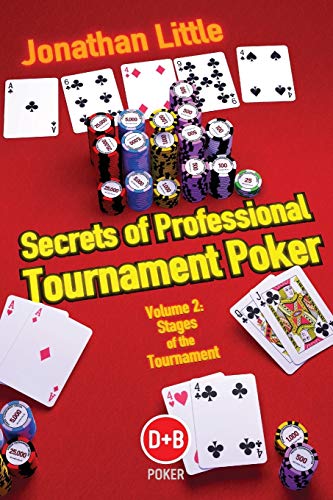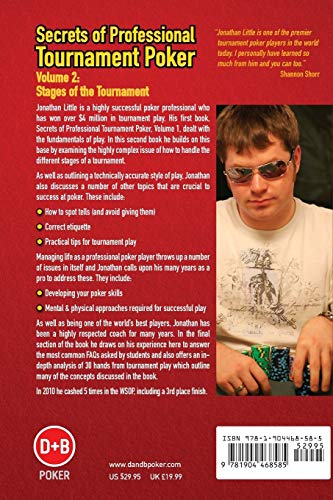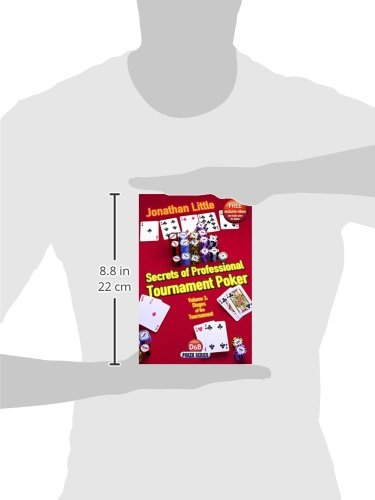



Secrets of Professional Tournament Poker, Volume 2: Stages of the Tournament
S**E
Practices What He Preaches
I've played against Jon before, at the 2014 WSOP Millionaire Maker event, early on day one. I didn't know who he was at the time, but I remember thinking he was an extremely annoyingly hard-to-read loose aggressive player, who was way out of line at my very tight table. He was also the CO to my BB, so my perception may be skewed on that. He dominated the table for the couple of hours I played with him - stealing at will, and certainly employing all of his LAG teachings.Also of note was his exceptionally controlled, yet cool, demeanor. While some people who play "blank" seem robotic, Jon has a very human, but completely indifferent presence at the table. He seems unfazed by anything - on table or off. He also avoids all conversation. I remember trying to engage in conversation with him a few times (I'm chatty, and he was sitting right across from me in seat 1, while I was in seat 4), and he offered very succinct, yet polite responses. He gave the distinct impression that he was there to work - not to make friends, make enemies, or engage in small-talk in any way. The only conversations he initiated were with the dealer, about the hand in play (if he was in it). To bolster that observation, when Jon first joined the table, Erick Lindgren was sitting at the other end in seat 8. Jon never exchanged a single word even with Erick - just gave a polite nod in his direction and took his seat to begin playing. He's all-work at the table.So it would seem he plays verbatim by the rule he's outlined in this book series. I'm convinced he isn't holding anything back in his advice (not much, anyway) .After I learned Jon was an author, I decided to buy all his books. I'm glad I did!This is, in my opinion, the best follow-up poker book of all time. When you're ready to fine-tune your game beyond the math, and address tells, your table "presence", and off-felt issues that may be affecting your game play, this is the book you should read. Jon really goes into exhaustive detail on these things - beyond what I've seen in any other book - and exposes you to the mindset of a winner.Of important note is the section on tells. If you've read Mike Caro's book, and think you're an expert on tells, think again. Caro certainly has published the most comprehensive list of tells in the game, but his book is mostly useless in any serious poker game, as every one of your opponents has either read his book, or at least has control over his facial tells. Jon's insight into other tells (e.g. the feet) explain a method for observing people for their unique, if subtle tells. I certainly came away from this chapter with some more insight into tell observation, where I may have had a more formulaic approach before.While I don't necessarily agree with all of Jon's specific choices (outlined in detail), or his (seemingly) over-conservative lifestyle, his decisive and quantitative analysis of WHY he makes those choices is incredible. You really get a sense that you're inside Jon's head while reading this book. His first-person, inward-focused writing style and complete candidness give you a level of emotional insight that you don't get from other "arm's-length" poker writers.The great thing about this book is that because he explores the WHY so deeply, you really don't have to pattern yourself after him. You can easily take his +EV analysis style and apply it to different things in your own way. Thus, you can avoid becoming a Little clone, and instead can still be yourself - just a better version thereof.Before Jon's books, I was a pretty strictly Harrington-archetype TAG player. Now I feel much more comfortable (though still quite inexperienced) as a mostly-LAG player. As such, I've found that although I get in the money less often, I get deeper into the money more often, and win significantly more often (I don't remember the last tournament I won as a TAG player). I've also started adapting the lessons from this book into my lifestyle. While the effects aren't immediately witnessed, I'm sure the long-term benefits will be there.If you're serious about tournament poker, and you've already read Harrington, I suggest you read all of Jon's books. They'll more than pay for themselves.
J**R
A Masters Degree in Tournament Poker
After reading Vol 1, I was convinced that Jonathan Little had written the perfect book for tournament poker players in the new and coming decade. At the time, I called Vol 1 a Bachelors Degree in poker. So why write Vol 2? Let's be honest, most poker books are a waste of time, and most great books are followed up by mediocre books. For example, Doyle Brunson's Super System should be on every poker player's bookshelf. Super System II? Pretty much a wasted read. Daniel Negreanu put out a book that has only one chapter worth reading. The rest could be burned without care by the average poker player. But most poker players who write (and some who can't spell) can't help themselves and put out book after regurgitating the same information over and over again.Having said that, this book is different. Vol 2 is a case study in how to be a poker player. If Vol 1 was a Bachelors Degree, the only description available for Vol 2 is Masters Degree.Moving beyond the math of poker, Vol 2 concentrates on specific personality traits, habits, and mindsets that are required to be a poker player. Knowing what the odds are in a particular hand is important, and Vol 1 covers that perfectly. Vol 2 then goes the next step and teaches why everything else associated with the hand is important. Then it discusses healthy living and why that is important. There's even pages devoted to why you shouldn't be playing poker at any given time. Very few poker writers have ever discussed in such detail why it is just as important to take your wife to dinner as it is to play poker, even if poker is your only way of earning income.I cannot possibly recommend both Vol 1 and Vol 2 enough. A friend of mine told me recently that Vol 1 was on back order, and he was concerned about reading Vol 2 before Vol 1. I can assure you that there is no problem in doing this. Read them both, in either order, and you'll be fine. But I guarantee you that you need to read them both if you want to succeed in today's game of poker. The game has changed well beyond Phil Hellmuth's "top 10 starting hands that you should play and fold all others" mentality. For example, in the books Jonathan Little starts a sentence like "you raise from middle position with 5-7 of hearts". My initial reaction was "wait, what?", and I reread it. And sure as can be, that's the sentence. Not "bluff with 5-7" or "try and steal with 5-7", but a simple matter of fact raise like we'd been taught to do in the past with A-K.Hey, the guy has nearly $5 million in lifetime tournament winnings, and was the WPT Player of the Year in 2008. Who am I to argue with that? My answer? I am nobody, and I am going to study the words of someone who is doing it NOW. You should too. Or not, if you're playing me. In that case, don't buy these books. But everyone else that I won't play against, you owe it to yourself to not only buy them, and not only read them....but STUDY them. And then wear a cap and gown when you're taking down your next poker tournament, since you will have absolutely earned your Masters Degree in Tournament Poker Play.
A**E
Need help picking up tells and reading your opponents, READ THIS!
Love this series! Reading Volume I & II helped my game to the point where I cashed in the WSOP Seniors Event - 2018. There were a record number of entries - 5,919. That's a huge field to get through! Made it to day two and min cashed. 775th out of almost 6,000 people. Love the narrative style of this book. The advice about table image was invaluable. I've played in five tournaments in two weeks all after reading the first two books and made a deep run in all but one of them and cashed in two! Thank you Jonathan Little!
C**L
Good Information for those who truly want to compete at the table
Very good information for those who finally come to realize that you just can't play the cards in your hand. If you want to improve your chances (or better yet, the opportunity) of success at the table, there is so much more to learn than mere 'face-value' of your pre-flop hand.It's a complicated game, and Jonathan Little's 3-Volumn elaboration on the matter will, depending on the reader, clarify considerably.But don't just read it once and put it on the shelf. Study it (do your homework), practice and apply at the table, and your game will improve.
V**I
Great Book, don't understimate.
This book isn't like the first book of the series,I liked very much because the 2nd book was quite easy compared to the first one.I have summarized both books into a notebook. While the first teachs purely strategy and technical concepts, beeing really hard to absorve, the second book teachs a kind of behaviour of professional poker players that is very easy to assimilatingThe book is very good! but sorry for my poor English.
A**S
The one that focuses on the professional aspiring people
I won't bother going to lenghts on this book series. It is the "Harrington series" of the 21st century!Great info on tournament play of current poker tournaments from a player that has the success record to back up his writings.Vol.1 has a ton of info on ournament playVol.2 also has some tournament play stuff and also lots of stuff about the life and situation handling of an aspiring professional poker playerVol.3 is the workbook of the series, loaded with a ton of examples from Jonathan Little's tournament hand histories.There is a lot of study in this series but the rewards surely make up for it. And then your poker playing will be so upgraded that you will find that you now are a much much better player.Highly recommended!PS: This review is common for all three books, since I got them all together and have an opinion for the whole package
A**E
Brilliant all round service.
Excellent poker books. All round good service.
H**F
I’ve learnt a lot
A very useful approach how to play your A game. Covers a lot from the poker strategy to the so called life balance. Much more than a poker book.
J**E
Great Poker Book
This has some great common sense advice. Alot of non-Poker playing guidance like mental preparation and eating well, which some readers may not think is necessary.
M**N
Found Vol 1 to be much more educational in terms ...
Found Vol 1 to be much more educational in terms of poker startegy, but the sections on professional poker life was really interesting.Even though (Sadly) not that usefull for me......Yet!
Trustpilot
1 month ago
5 days ago